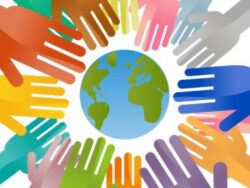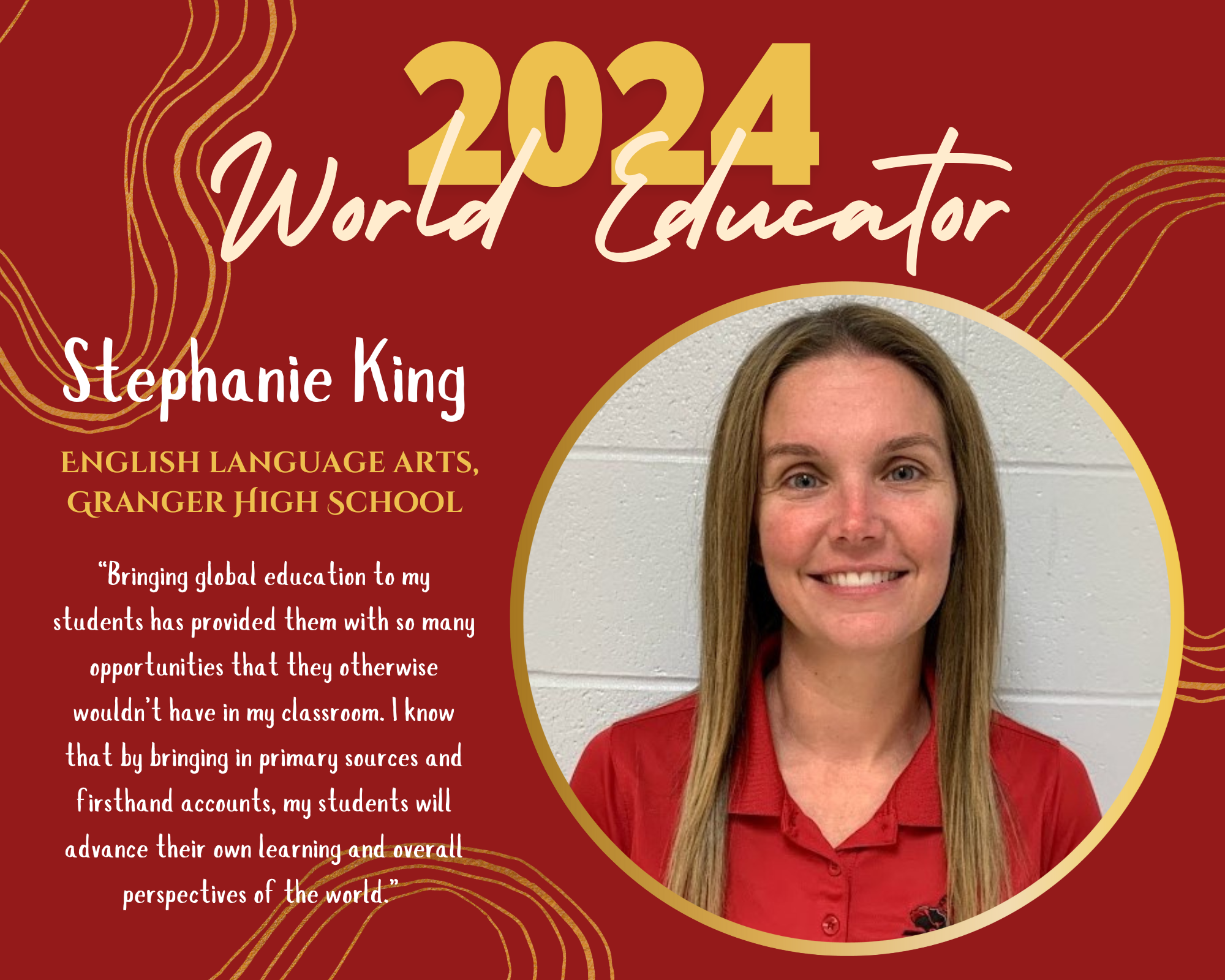World Educator Award

Nominate an Educator for the World Affairs Council’s 2024
World Educator Award!
Each year, the World Affairs Council honors a local educator who has made exceptional contributions in broadening the global horizons of students and colleagues. The recipient of the World Educator Award is an outstanding K-12 teacher who promotes international understanding in the classroom and contributes to the development of resources so that other educators and community members are better prepared to meet a major challenge of our time. Our children’s lives will be defined by the world within and beyond our borders; a World Affairs Council World Educator is someone who works to ensure that their students’ learning is reflective of that reality.
Whether you are a teacher and have a colleague who has been a leader in promoting international understanding at your school, a student and have a teacher who has expanded your worldview, or are a parent who is grateful for the role a teacher has played in shaping your child’s perspective–we look forward to reviewing your nominations!
The World Educator is inducted into the World Affairs Council Fellows Program free of charge, and is given the opportunity to lead a Global Classroom workshop during the academic year of their award.
To nominate a World Educator, simply send us an email with the name of your nominee, their email address, and your reason for nominating them.
Please send nominations via email to jpatterson@world-affairs.org by 5:00 PM, March 31st, 2024.
*Please note that educators must work in Washington state to qualify for the award.
Congratulations Stephanie King,

the World Affairs Council’s 2024 World Educator!
Stephanie King is a dynamic force at Granger High School, where she imparts her passion for English Language Arts while also guiding students towards University of Washington transcripts through the College in the High School program. Beyond academics, Stephanie is deeply involved in the school community, serving as a coach for both middle and high school girls’ soccer teams and dedicating herself to extensive volunteer work.
With a lineage rooted in education—her parents being public school teachers—Stephanie’s commitment to the field runs deep. She’s not only a respected educator within her own school but also plays a pivotal role at the state level as a member of the Bridge to College leadership team and as Washington’s representative for the NEA Foundation’s Global Learning Fellowship.
Stephanie’s impact extends far beyond her classroom walls. She’s a skilled grant writer, securing funds for various educational initiatives within her district, and her experiences as a Fulbright Teacher for Global Classrooms in Morocco are documented on her website, inspiring others with her international perspective. Through partnerships with news outlets and organizations, she champions student writing, amplifying their voices on broader platforms.
Her dedication to embedding global competencies into her curriculum has earned her recognition through fellowships with prestigious institutions like the Library of Congress, Pulitzer, and American University. But perhaps most importantly, Stephanie understands that education is about fostering connections and creating inclusive environments where all students feel valued. She prioritizes building relationships, taking time every Monday morning to engage with her students about their lives outside of school.
Stephanie’s commitment to social emotional learning and equity is evident not only in her classroom but also in her role as a leader in professional development nationwide. By promoting these values, she ensures that education goes beyond just academics, fostering holistic growth and empowering students to thrive in a diverse and interconnected world.
What does it mean to you for someone to be a “World Educator?
“Being a World Educator means advocating, teaching, and working towards a more just world. Teachers must be motivated by their students to broaden their own experiences. Being able to expose students to global learning is only the first step of being a World Educator. Teachers have a responsibility to bring global competencies, international relations, the United Nations Sustainable Development Goals, and new experiences to their district, building, and classroom. World Educators must impact their colleagues as well. Teachers need to create and share materials that integrate the four domains of global competence: investigate the world, recognize perspectives, communicate ideas, and take action. These lessons and activities must reach a range of students, not just those that work directly with a World Educator. The essential goal for a World Educator is for their students to develop as globally competent citizens. Implementing global learning units and engaging with new resources will motivate students to pursue new experiences for themselves. A World Educator must foster students’ desire to learn about the world and disrupt the status quo. It is not enough to simply teach, but for an educator to take action. We must model for our students what we ask them to do.”
How have you demonstrated those qualities in your own work?
“I currently work with my students and community to help create links between their reality and the world around them. When it comes to global learning, early in my career I realized that what I was teaching didn’t resonate with my students. I took it upon myself to broaden my abilities and bring global education to my school. After being selected as a Fulbright Teacher for Global Classrooms during the 2022-23 school year, global learning has become the focal point of my teaching. Being able to develop a Global Learning Unit and receive feedback from educators across the country has led me to further integrate global competencies and Sustainable Development Goals into all units and courses I teach. Currently I utilize a number of resources and networking opportunities to enrich my teaching and bring new perspectives to my students. My students have engaged in conference calls with journalists from the Pulitzer Center to learn about underreported stories and why they matter. I also worked with the World Affairs Council this year to partner with the U.S. Department of State’s International Visitor Leadership Program (IVLP) to host guest speakers from around the world. This helped students understand their local populace and how it is connected to the global community. After my Pulitzer fellowship, my students then created action plans on how to help others, specifically focusing on shelter and hunger. I did this intentionally to expose students to the SDGs and to think globally while acting locally.
After I visited Morocco with the Fulbright program, my students have continued to create Flip videos to share with my partner teacher’s students across the globe. My students engaged with this activity on a national level when we partnered with a high school in Colorado to learn about perspectives and communicating with those with views different than one’s own. These interactions have enabled students to investigate the world and practice communicating their ideas through writing and speaking. Another example of global education in action at a local level is the letter exchange I established with a fellow educator at Renton High School. After creating the Flip videos with Colorado, I wanted to engage my students through writing to continue investigating the world through words. I had my students write to students with the rule that they couldn’t include their social media or last name. We discussed the significance of getting to know someone on a human level without seeing what they look like. This paired with a lesson using GapMinder’s Dollar Street website in which only pictures and videos are used to show how people live around the world.”
How would receiving the 2024 World Educator Award help you further?
“Bringing global education to my students has provided them with so many opportunities that they otherwise wouldn’t have in my classroom. I know that by bringing in primary sources and firsthand accounts, my students will advance their own learning and overall perspectives of the world. Receiving the 2024 World Educator Award will help me incorporate new methods to improve student learning and have them see themselves as catalysts for change. To engage with an opportunity such as this would provide me with insights that I otherwise would remain unaware of, as first hand experiences are truly the best way to learn. Being aware of one’s own deficits are not enough anymore, one must pursue the knowledge needed to bring about change and impact. I know that by improving on my own areas of weakness, I will become a better educator for my students. My school’s current level of global learning is close to non-existent. While we do not have formal systems in place to foster this construct, our students have great experiences with education outside of the U.S. These experiences of attending school in Mexico should be capitalized upon; however, at a building or district level, they are not.
Receiving the 2024 World Educator Award would further support the work I have done in my rural, conservative district. While I have a positive relationship with my school board, garnering this attention would further bolster my abilities to integrate global education into more classrooms on a broader scale. This ultimately will increase global perspectives and understanding in my school community. This reflects the potential impact for all of my students, of which are all considered either at-risk, underserved and/or underrepresented. I want to impact my colleagues and show them that educators from Title I schools can do great things. It is a struggle for schools such as mine to recruit and retain highly effective teachers, but when our district is able to promote current accomplished teachers, it makes it easier to convince others to come to Granger. Earning this recognition will have a direct impact on our students, the most vulnerable in American society. Students such as mine need the most effective, qualified educators- research proves this. The World Educator Award will improve my abilities as an educator, through the fellowship, which in turn will increase student learning in my classroom and district.”
World Educator Award Recipients:
2023 – Laura Adriance, Daniel Bagley Elementary School
2022 – No educator selected due to COVID-19*
2021 – No educator selected due to COVID-19*
2020 – No educator selected due to COVID-19*
2019 – Hiromi Pingry, John Stanford International Elementary School
2018- Melissa Moffett, Industrial Design, Engineering, and Art (IDEA) School
2017- Jeff Blair, The Northwest School
2016 – Eileen Hynes, Lake and Park School
2015 – Patrick Grant, University Prep
2014 – Brandon Frederick, Bonney Lake High School
2013 – Noah Zeichner, Chief Sealth International High School
2012 – Hands for a Bridge, Roosevelt High School
2011 – Lisa Clarke, Kent-Meridian High School, Kent
2010 – Erin Lynch, Nathan Hale High School, Seattle
2009 – Ben Wheeler, Explorer West, Seattle
2008 – Bob Mazelow, Lakeside School, Seattle
2007 – Ryan Hauck, Marysville-Pilchuck High School, Marysville
2006 – David White-Espin, Secondary Bilingual Orientation Center, Seattle
2005 – Betty Lau, Franklin High School, Seattle
2004 – Wendy Ewbank, Seattle Girls’ School, Seattle
2003 – Patricia Burleson, Island View Elementary School, Anacortes
2002 – Mary Ellen Cardella, Office of Minority Affairs High School, Seattle
2000 – Sue Pike, Foster High School, Tukwila
1999 – Gretchen Coe & Anne Fitzpatrick, Mercer Middle School, Seattle
1998 – Mary Hammond Bernson, Jackson School of International Studies, Seattle
1997 – Keith Forest, Decatur High School, Federal Way